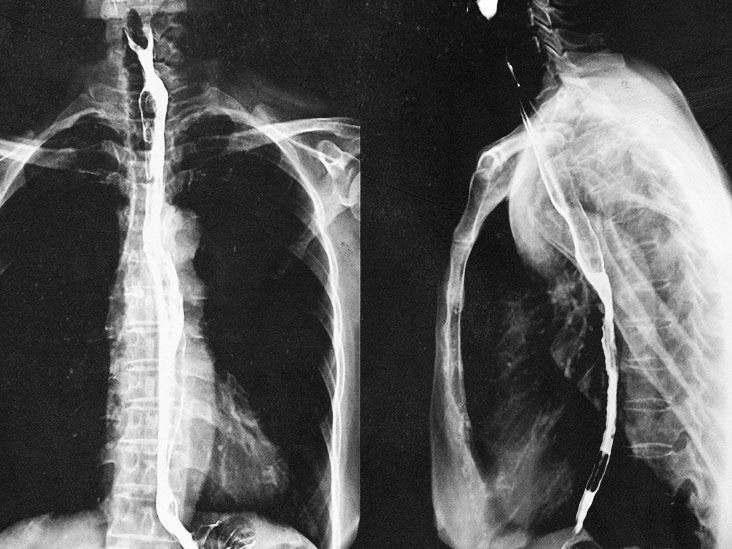Gastroesophageal reflux disease (GERD) is a condition where stomach contents travel back up the esophagus towards the throat. Asthma is a respiratory condition that affects the airways.
GERD and asthma may trigger each other due to the connection between the esophagus, stomach, and airways, as well as side effects of certain asthma medications.
This article discusses the link between GERD and asthma, treatment for both conditions, and when to contact a doctor.
People with asthma may have an increased risk of developing GERD, and GERD may worsen asthma. GERD and asthma may have a link due to the following:
The esophagus is a tube that connects the throat to the stomach. Nerves in the lower part of the esophagus connect to nerves in the lungs, which means acid reflux can trigger symptoms of asthma.
The vagal nerve connects the brain to the stomach and affects multiple organs in the body. Acid reflux triggers the vagal nerve, which causes the lungs to become more sensitive to asthma triggers, such as irritants or allergens.
As contents from the stomach and stomach acid travel back up the esophagus, small particles of acid can also get into the airways. This can trigger asthma symptoms, such as chest tightness.
According to the American Academy of Allergy, Asthma, and Immunology (AAAAI), people who have asthma have a higher risk of GERD.
At the lower end of the esophagus, there are a group of muscles called the esophageal sphincter.
When the esophageal sphincter closes, the muscles prevent stomach acid or contents from traveling back up towards the throat.
During an asthma flare-up, pressure changes occur inside the chest and abdomen. This causes the esophageal sphincter to relax, which can cause stomach acid or contents to travel back into the esophagus.
Some asthma medications, such as theophylline, may also worsen acid reflux. The overuse of quick-relief inhaler medications, such as albuterol, can also trigger GERD. This is because albuterol also relaxes the esophageal sphincter.
Symptoms of GERD can include:
People who have both asthma and GERD may find that treating GERD can help to reduce their asthma symptoms and use of asthma medication.
If a person has symptoms of GERD and moderate to severe asthma, a doctor may advise them to take a proton pump inhibitor (PPI), such as omeprazole or esomeprazole,
A person should take the PPI before breakfast and dinner for it to be effective. Doctors may prefer PPIs over H2 blockers and other over-the-counter (OTC) medications because PPIs prevent gastric acid secretion more effectively.
The treatment of asthma with medications such as theophylline may lower a person’s esophageal sphincter tone and cause GERD symptoms. Doctors may not choose to prescribe theophylline to people with asthma due to its side effects and interactions with other drugs.
Doctors may refer a person to a gastroenterologist if GERD does not improve with twice-daily PPI therapy or if they develop more serious symptoms, such as difficulty swallowing.
Surgical fundoplication is a procedure where surgeons fold and sew the top part of the stomach, or fundus, around the lower esophageal sphincter. This may be appropriate for refractory GERD in selected people.
However, people may still require medical therapy for GERD after fundoplication.
Home treatments to help manage GERD include:
Dietary changes may also help, and people may need to avoid:
For children with GERD, the following may help:
To help control asthma, people may find the following helpful:
For children with asthma, the following may help:
People should contact their doctor if they have symptoms of GERD or if symptoms are not improving with treatment, such as medications or lifestyle changes.
People should also contact their doctor if they have any of the following symptoms:
For asthma, people will need to seek immediate medical help if asthma medications, such as a quick-relief inhaler, do not improve symptoms of an asthma attack or if a peak flow number for breathing is low.
Young children with asthma will need immediate medical attention if they:
GERD and asthma may trigger each other due to the use of asthma medications or the connection between the stomach, esophagus, and airways.
Managing GERD symptoms may help to reduce asthma symptoms, along with taking any steps to manage asthma with medication. Dietary and lifestyle changes can also help to manage both conditions and reduce symptoms.
Last medically reviewed on December 23, 2021
Gastroesophageal reflux disease (GERD) is long-term, regular acid reflux. This can cause heartburn and tissue damage. Medication and surgery can treat…
Honey is a common home remedy for sore throats and coughing. It is known to have antibacterial and anti-inflammatory properties. In this article, we…
Asthma is a chronic lung condition that leads to episodes when a person’s airways become obstructed, and they experience severe breathlessness. There…
Researchers have studied a possible link between dairy and asthma but have not found a clear connection. Learn more about asthma, dairy, and some…
H2 blockers, sometimes called H2 receptor antagonists, reduce the amount of acid that the stomach produces. Read more about them here.
OUR BRANDS
